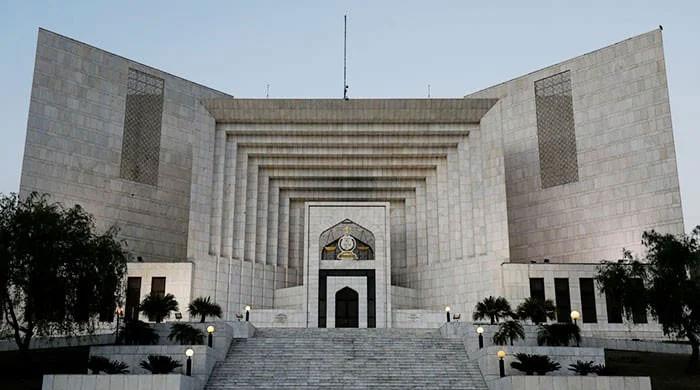Imran Khan happy with top court’s judgment on NAB law amendments: PTI lawyer
"Imran Khan expressed joy over Supreme Court's verdict," says Shoaib Shaheen
September 15, 2023

- Shoaib Shaheen says he met Imran Khan in Attock jail.
- PTI chairman is very happy over SC judgment: lawyer.
- "We could not talk about the president's letter."
Pakistan Tehreek-e-Insaf (PTI) incarcerated Chairman Imran Khan on Friday expressed joy over the Supreme Court’s (SC) verdict wherein the top court ordered to restore corruption cases against public office holders that were withdrawn after amendments were made to the country’s accountability laws, said his counsel Shoaib Shaheen.
A three-member bench of the apex court in a majority 2-1 verdict approved Khan's petition challenging amendments made to the accountability laws during the tenure of the previous Pakistan Democratic Movement (PDM)-led government.
The bench, headed by CJP Umar Ata Bandial, and comprising Justice Mansoor Ali Shah and Justice Ijazul Ahsan, held more than 50 hearings on PTI chief Khan's petition against the amendments and reserved the judgment on the hearing on September 5.
In the majority verdict today, the SC restored graft cases against public office holders that were closed down following the amendments.
Former prime minister Nawaz Sharif, former president Asif Ali Zardari and former premier Yousuf Raza Gillani are likely to face inquiries after the SC in a 2-1 verdict struck down some of the amendments made to the National Accountability Ordinance (NAO), 1999. The top court declared nine out of 10 amendments null and void while Justice Shah issued a dissenting note in the case.
Talking to journalists, Shaheen confirmed he met the PTI chief, who was handed down a three-year imprisonment in Toshakhana case, in Attock jail.
On August 5, the former prime minister was arrested from his Zaman Park residence in Lahore after being convicted in the Toshakhana case with accusations of misusing his 2018 to 2022 premiership to buy and sell gifts in state possession that were received during visits abroad and worth more than Rs140 million ($635,000).
“The PTI chairman was very happy over the verdict,” said his lawyer. He added that matters related to NAB laws were discussed in the sitting.
Responding to a question, Khan's counsel said: "We could not talk about the president's letter."
On September 13, President Arif Alvi suggested a cut-off date for the holding of polls in a letter to the chief election commissioner (CEC).
The president said that in the light of Article 48(5) of the Constitution, he has the authority and mandate “to appoint a date not later than 90 days from the date of dissolution [of assemblies], for holding of a general election to the assembly.”
President Alvi said that the National Assembly was dissolved by him on the advice of the then-prime minister Shehbaz Sharif on August 9, 2023.
[…] in terms of Article 48(5) the general election to the National Assembly should be held by the eighty-ninth day of the date of dissolution of the National Assembly, i.e. Monday 6th Day of November 2023,” the letter stated.
NAB amendments
The NAB amendments not only reduced the four-year term of the NAB chairman and the bureau’s prosecutor general to three years but also placed all regulatory bodies functioning in the country out of NAB’s domain.
Furthermore, the changes included that a three-year term be set for the judges of the accountability courts and that courts be bound to decide a case within one year.
Challenging the amendments, Khan approached the apex court and petitioned that the amendments be struck down on the grounds that they were unconstitutional.
The petition argued that amendments to sections 2, 4, 5, 6, 25 and 26 of the NAB law are against the Constitution, along with amendments made to sections 14, 15, 21 and 23.
Furthermore, Khan argued that amendments in the NAB law are contrary to the fundamental rights of Articles 9, 14, 19, 24, and 25.
All these amendments made in the NAB law should be declared null and void, the PTI Chairman had requested.
To hear Khan's plea, a special 3-member bench was formed on July 15, 2022. The first hearing of the case against the NAB amendments was held on July 19 last year after Khan's lawyer Khawaja Haris filed an application 184/3 against the NAB amendments.
Both the federation and NAB were made parties in the petition.











